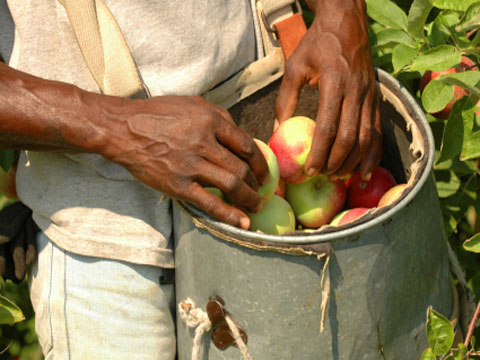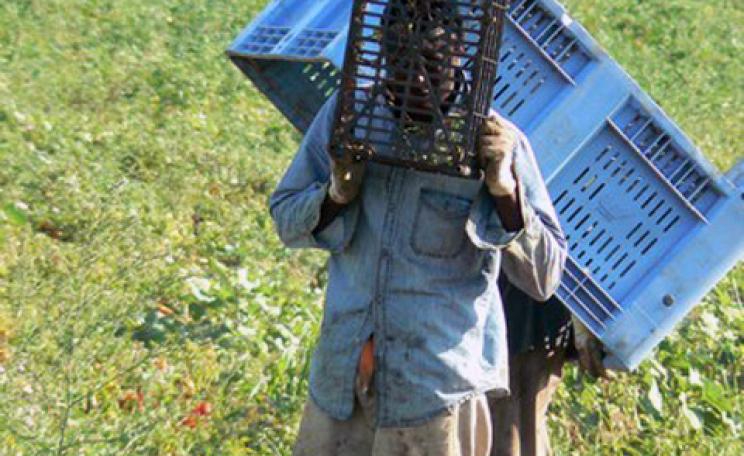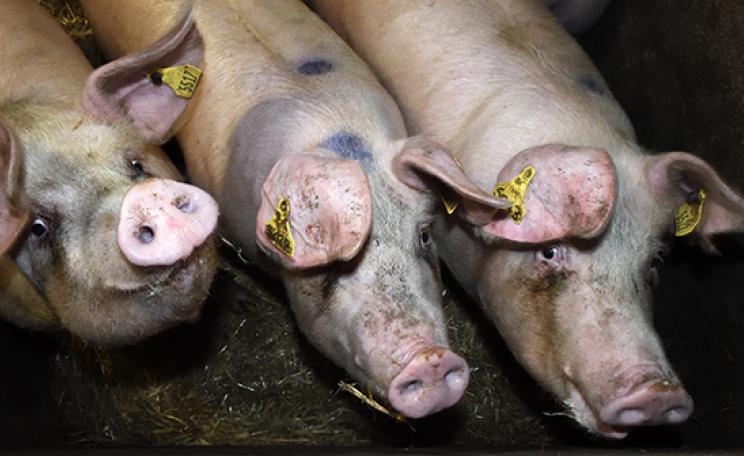You've probably never heard of Barway, a small village just outside of Ely in Cambridgeshire, but chances are you’ve eaten a lettuce that was grown there. Barway is home to G’s Marketing, one of the UK’s largest suppliers of salad and vegetables – and one of the largest employers of migrant workers in the horticultural sector.
G’s is part of the Shropshire Group, a major farmers co-operative supplying lettuces, beetroots, celery, radishes, leeks and onions to Britain’s top supermarkets, wholesalers and processors. The group, which has a turnover of more than £240 million, has won accolades for its treatment – and unique facilities – of the thousands of migrant workers it employs each year, mainly from Eastern Europe.
As part of our major investigation into conditions for migrant workers employed in the horticulture sector, the Ecologist was granted unique access to the company’s operations – from touring workers' accommodation to visiting the harvesting rigs to meeting employees in the packhouse and business department, the nerve centre where the company ensures that constant, round-the-clock orders from retailers and other clients are met.
During peak seasons the group employs as many as 4,500 people – many of them migrants – at cultivation and processing sites in Cambridgeshire, Norfolk, Warwickshire, Gloucestershire and beyond: the company also has operations in the Czech Republic and Spain, the latter ensuring a year-round supply of produce even outside of the UK growing and harvesting season.
The workers housed at the main company hostel at its Barway headquarters are recruited directly from Eastern European countries; G's says it doesn’t charge workers a fee for joining the company – in contrast with many agencies and gangmaster outfits which do. Some other parts of the business do rely, from time to time, on gangmaster-supplied workers.
The Barway hostel houses up to 600 workers – including Poles, Bulgarians, Lithuanians and others – in dormitory style accommodation or, when at capacity, in a few nearby caravans. Each room contains six beds, a freezer and a fridge (workers cook in a separate dedicated kitchen, or eat in an onsite canteen). Couples can apply for a space in a dedicated two-person room. There’s also a shop, an internet café, a social centre – complete with a well stocked bar – as well as football and basketball pitches, a tennis court and outdoor barbecue area.
The salad village
It isn't a hotel – the building is closer to a university halls of residence with long corridors, artificial lighting, fire notices and communal bathrooms. Stepping outside, the industrial nature of the site becomes more apparent: almost immediately adjacent to the main accommodation block are the ‘spillover’ caravans, further washrooms and other factory buildings that form part of the giant processing plant that churns out salad and vegetables seven days a week.
But, as the company maintains, people are here to work, to make money to take home to pay for university, to help towards buying a house, to get married. They’re not here to enjoy a holiday. The money most earn at G’s far exceeds what they could expect to earn back home (in one example mentioned, a week’s wages at G’s enabled a worker to pay his college accommodation back home for many months in advance.)
It’s quiet when the Ecologist visits. It’s mid-morning and most of the workers are out in the fields or busy in the packhouse. One or two are resting in the bedrooms and there’s a few ouside reception where small groups are standing or sitting around chatting, smoking or talking on mobile phones. Someone’s hosing down the floor, and some machinery whirs in the background.
The staff at the hostel are genuinely enthusiastic about the facility. Will Goosen, a manager at the Barway hostel, says he believes the company offers foreign workers a good package: they are offered regular work, decent pay, good living conditions and social facilities which far exceed that provided by many other companies. If workers have a problem, be it personal, practical, or relating to work, the hostel staff are on-duty 24 hours a day, he says. Additionally, there’s a dedicated phone service for workers to make any complaints in their own language to an independent third party which operates the scheme.
Workers receive an induction when they arrive at Barway in their native language – something which can, Goosen acknowledges, be challenging – are allocated a room, enrolled at a local medical centre and given assistance with other practical matters such as opening a bank account if needed. The migrants typically come to G’s on contracts of between three and six months – as much as 65 per cent come back – and spend up to six days a week working shifts involving the planting, harvesting or processing of salad and vegetables. Each day, rotas are posted on a giant work allocation sheet so workers know what shift they are doing and in which team.
More you work, more you earn
Most workers are paid on a piecework system with payment based on results – the more work completed the more money a worker earns – although some jobs are based on an hourly rate. G’s says all its payment rates are in accordance with the current national minimum wage (£5.93 per hour) or the agricultural wages order (£5.95 per hour), which is soon to be scrapped with the winding down of the Agricultural Wages Board.
Typically, according to the company, workers earn around £250 per week; a figure that can rise for experienced – and fast – employees. All workers are expected to carry out overtime, orders permitting, and all pay tax and national insurance as they are fully registered and legally working in the UK. £32 is deducted each week for accommodation.
Workers at Barway are not part of a union, although the company operates an Employers Consultative Committee (ECC) system, where elected representatives can make representations to management on any aspect of their employment. Although there is not much free time – during peak seasons (April until October) workers are in the fields or factories six days a week – the company lays on excursions and organises social activities. The Barway plant has a yearly ‘open farm Sunday’ when members of the public are invited to the facility to meet workers and see the operation for themselves.
According to Sharon Cross, group HR operations manager, the company has steadily built up a good relationship with the local community, and gone to great lengths to ensure people are aware that workers inject money back into the wider community by using local shops, pubs and other services. This contrasts with reports from elsewhere across East Anglia, Lincolnshire and beyond which have consistently described relations between migrant workers and locals as being marred by hostility.
G’s unique approach – building dedicated accommodation and supplying workers with just about every facility they need in one location – has undoubtedly reduced the risk of problems. If the thousands of migrant workers G’s employs each year tried to find rental accommodation in local towns or villages there’d be massive concerns over overcrowding and conditions, as well as a knock-on effect for locals trying to find somewhere to live. Additionally, such circumstances could attract the attention of unscrupulous characters looking to cash in on easily exploitable workers.
Several locals in Ely the Ecologist spoke to weren't even aware of the G’s operation; two others said they’d heard of the company but had only been told ‘good things’; a third person knew all about it – her husband worked at Barway. There are also those who hold the common opinion that foreign workers are taking jobs that Brits could do, but, as has been repeatedly demonstrated, most British workers don’t want to do this work because of its physically demanding nature.
G’s are upfront from the outset about the work they offer: ‘We work outdoors in all weathers and the jobs tend to be physically demanding…’ the company’s website says. ‘The work is mostly manual planting, picking and harvesting of salad and vegetables, which involves a considerable amount of bending, walking and lifting.’
Relentless pace
The Ecologist visited workers harvesting both lettuces and celery out in the fields beyond Barway. The work is undeniably tough, with teams of pickers shuffling slowly in the mud alongside the giant ‘rigs’ that double as mobile factory processing units. The celery teams, consisting of between 13 and 16 workers, continuously bend, grab a stick, cut the bottom, cut the top, chop off the leaves. Then it’s onto the conveyor belt which carries the vegetables into the processing area above. Here, the celery are sized, washed and wrapped – all virtually automatically (small and overweight units are separated for later use in vegetable snack pots assembled in the packhouse).
It’s relentless, dirty, noisy work. This is Europe’s biggest celery grower. Ysvetomir Tsenkov, celery harvest manager, explains how as many as 30 million sticks of celery are cut and processed here each year between June and November. As many as 200 workers can be out on the rigs harvesting at any one time, each rig completing an eight hour shift that will see thousands and thousands of sticks picked. During peak seasons it can be a 24 hour operation – the company has giant spotlights which can be brought in to illuminate the fields so workers can harvest through the night.
One worker looks up from his job in the processing area and shrugs, saying if he didn’t like the work he wouldn’t stay. He’s living at Barway and says there’s lots of people and much socialising. His girlfriend is also here. He’s studying economics back home but needs the money that this work provides. Another man – who says where he’s from but it is impossible to hear – appears less enthusiastic, saying that although the money is good, the work is hard and he’s looking forward to returning home.
On the rigs harvesting little gem lettuces, the pace is just as intense: today there’s five rigs with crews of 21 each working the fields; 10 to 12 people cutting down below, the others on top. As many as 70,000 little gem lettuces being harvested in one day is common – there was one occasion when staff say 132,000 were picked in a single day. Upstairs, in the noisy rig bay area, the lettuces come off the conveyor belt thick and fast, straight into plastic wrapping. These are going to Tesco, the labels indicate. They’ll leave Barway tonight, a worker explains, go to the depot and then be on their way to the supermarket shelf soon after.
We leave the lettuce gang to it, swapping the exposed rig for a comfy 4x4. It’s dry outside today, but I wonder what things are like when it’s raining. A canopy is used, says Will Goosen, but the ground, and just about everything else, including the workers, presumably still get soaked.
Intensive supply chains
Back in the packhouse, the Ecologist accompanies a shift of workers about to start processing and boxing up some of the produce coming in from the surrounding fields. Biosecurity is tight; overalls and hairnets are given out and hands washed while bags and other items have to be left in the locker room. Inside, teams of operatives are busy on production lines laid out in front of a wall containing data relating to the days’ orders – how many of each product, in what format and at what price. This is where the scale of the G’s operation really becomes clear. Information is processed through to here from a team of product managers and logistics experts situated elsewhere in the building. A supervisor oversees processing and the dispatching of large consignments out to waiting trucks.
Charlie Kisby, product manager, based in the company’s business centre, later talks me through the complex process of ensuring the company’s clients – including all of the major supermarkets – receive what they want, when they want it. At 8am an order may come in, for say 10,000 or 20,000 lettuces - by 6 or 7pm that consignment needs to have been ordered, harvested, processed, boxed up and be on its way to the depot. This is a typical time span but it can vary. G’s gets paid on what it delivers. It’s very rare for an order to be ‘dropped’ and not delivered.
There’s night shifts organised to cover extra large orders, or a shortfall from daytime harvesting – if not enough workers are booked in, loudspeaker messages are broadcast at the hostel asking for extra hands who want to do overtime – alongside a 24 hour packhouse operation if needed. Nothing is left to chance and orders are predicted; the company has a dedicated computer system to enable it to accurately forecast sales, which takes into account myriad factors including historical order data, weather and supermarket promotions. Nothing can entirely equip the operation for some unexpected events however, such as when the BBC weather forecast predicts it is going to be hot and sunny and people get planning their barbeques. When this happens, orders for lettuce can go through the roof.
All this is explains in part why the industrial horticulture sector – in common with most other types of agriculture – is increasingly dominated by fewer, and larger, more integrated operators. The intense, last minute nature of modern supply chains means smaller, less well equipped outfits simply couldn't cope with the demands of the large retailers. The G’s operation is the salad equivalent of the ‘mega farms’ currently being touted to supply the UK’s appetite for cheap pork or milk.
Kisby acknowledges that there’s not many small players any more. Despite this, he believes there’s still only two key resources needed; soil type, and the people who make up the business. Without people, the business simply couldn't function, he says. There’s no replacement for the human eye and judgement. He says that if the company didn't look after its workers, its labour source would dry up: from an ethical point of view, it’s the right thing to do, he argues.
The cheap gang labour of the past is not going to do.
| READ MORE... | |
 |
NEWS ANALYSIS News investigation Bitter harvest: migrant workers on UK farms still face exploitation Migrant workers are vital to meeting UK demand for year-round fruit and vegetables. But despite improvements in the horticulture sector since the Morecambe Bay tragedy, allegations of poor conditions and abuse persist. Andrew Wasley reports |
 |
NEWS ANALYSIS News investigation Scandal of the 'tomato slaves' harvesting crop exported to UK Across Italy an invisible army of migrant workers harvests tomatoes destined for our dinner plates. Paid poverty wages and living in squalor, medical charities have described conditions as 'hell'. Andrew Wasley reports from Basilicata, southern Italy |
 |
HOW TO MAKE A DIFFERENCE The Harvest: new film reveals scourge of child labour in US farming Despite campaigning to reduce child labour internationally, the US is home to at least 230,000 child labourers toiling in the fields to pick blueberries, tomatoes or cotton |
 |
NEWS ANALYSIS PG Tips and Lipton tea hit by 'sexual harassment and poor conditions' claims Unilever denies some female employees at its Rainforest Alliance-certified tea plantation in Kenya are subjected to sexual harassment. But Dutch research outfit SOMO paints a very different picture. Verity Largo and Andrew Wasley report |
 |
COMMENT Why ethical food trade is only possible with supermarket action International supply chains leave the horticultural workers harvesting our food in poor countries highly vulnerable to exploitation. Retailers, unions, NGOs and governments must work together to tackle this, says Julia Hawkins |







